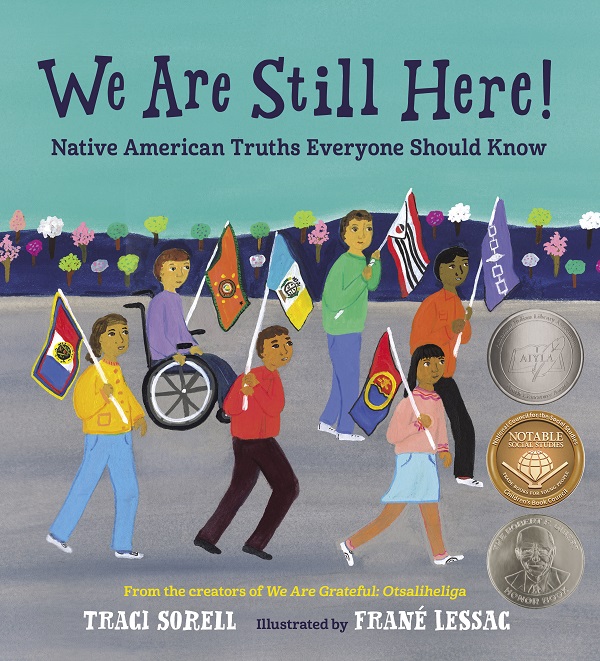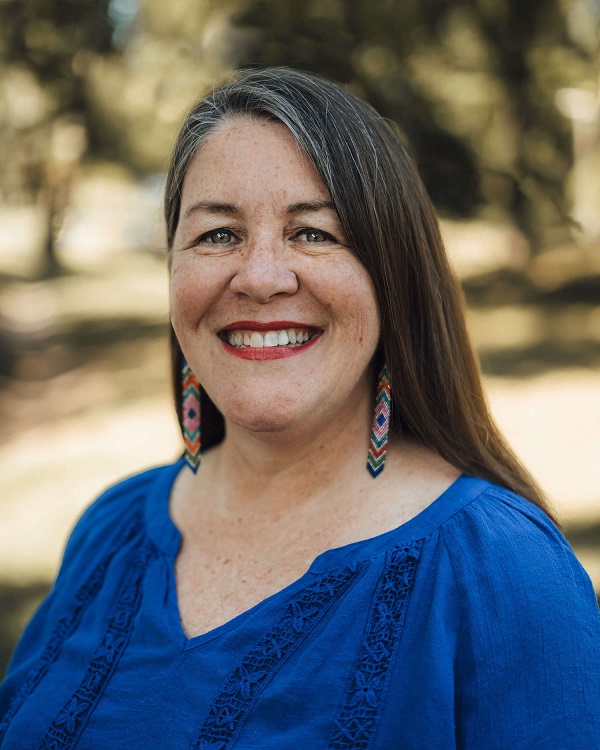Meet-the-Author Recording with Traci Sorell
We Are Still Here!: Native American Truths Everyone Should Know |
Traci Sorell introduces and shares some of the backstory for creating We Are Still Here!: Native American Truths Everyone Should Know.
Translate this transcript in the header View this transcript Dark mode on/off
Traci Sorell: Siyo, Traci Sorell dagwadoa. Tsi tsalagi.
Hi, I'm Traci Sorell. I'm a Cherokee Nation citizen. I'm also the author of We Are Still Here! Native American Truths Everyone Should Know illustrated by Frané Lessac and published by Charlesbridge. This is a middle-grade nonfiction picture book that targets children in upper elementary and beyond with facts and truth, policies, laws, etc.,that everyone in this country should know but we haven't been taught. Not in our K-12 schools, public or private. We don't see it represented in pop culture. So, I wanted to share with young readers and other people beyond, what is that 25,000 foot level look like? To show the agency or the active presence of Native Nations from the end of treaty-making in 1871, when the United States says, "We're no longer going to sign treaties with Native Nations."
Reservations had been established. But diplomacy takes other forms. Native Nations and the United States government are still working together. What does that look like? There are a number of policies presented, but the refrain that repeats on each two page spread is, "We are still here." It was written from the perspective of Native Nations. That we are still here represents survival. That in the onslaught of colonialism and very destructive laws and policies, Native Nations survived to where we are more currently, which is a place of more thriving. You see that as the book goes along. That there is more recognition and more ability for tribes to exercise their sovereignty, taking care of their people, lands, resources, and those that live around them. I'm just super excited to share this with everyone.
My favorite part in sharing the book is that I had to wait until I was an adult to learn this. I'm a first-generation college graduate. I didn't know all of these things that have happened to Native Nations and tribes across the country. I knew what had happened to Cherokee people, my ancestors, and fellow Cherokee citizens. I didn't even know all of that history.
This book excites me because now I know that young people across the country are going to learn this much, much sooner than I did. That makes me happy that we will have educated young people and hopefully adults too will read it and know these things and be able to be better community members to each other and understand the respect for sovereignty of Native Nations because that's not what I grew up learning about.
In the book the focus... We've had this ongoing focus on assimilation and having Native Nations and their citizens lose their culture, lose their language. That was definitely a US policy. Where we see a turning point in the book is in a section called Tribal Activism. Now, tribes have always been active. They've always been advocating for policies. But we really see Native citizens also becoming equally as involved as the tribes in the 1960s. That really goes along too with what's happening nationwide with the Civil Rights movement and then the Black Power movement.
There's a spread in the center of the book called Tribal Activism. I'll read that section:
Native citizens continued to speak up, organize, and increase our long-standing commitment to . . . strengthen tribal sovereignty . . . speak out about termination and relocation . . . recover our lands and harvest traditional foods . . . draw attention to Native peoples' lack of sufficient health care . . help students go to college, including on tribal lands. With our collective voice and presence, Native Nations say, "We are still here."
This Meet-the-Author Recording with Traci Sorell was exclusively created in May 2021 by TeachingBooks with thanks to Charlesbridge.




